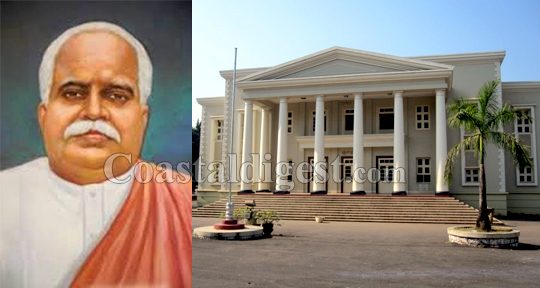Mangaluru, Jul 30: The Mangaluru City Corporation has resolved to name the Town Hall after social reformer late Kudmul Ranga Rao, who fought for the rights of depressed classes and strived for their welfare.

The decision comes about six months after the renovation of the five decade old Town Hall of Mangaluru, which hosted thousands of political, social and cultural events in the past 50 years.
Who is KRR?
Kudmul Ranga Rao (29 June 1859 – 30 January 1928) was a social reformer from Kudmul, a village in the erstwhile Madras Presidency, (in the present-day Dakshina Kannada district) who established "Depressed Classes Mission" in 1897 in Mangaluru for providing education, better housing, drinking water and empowering the backward classes socially by guarding them against exploitation by upper classes.
He was born into a middle-class Goud Saraswat Brahmin community. His father, Devappayya, worked as a clerk under a landlord and his mother, Gauri, a housewife. Rangarao completed his primary education in Kasaragod, before losing his father when he was 16.
Moving to Mangaluru in search of a job, he began working as a teacher for a monthly salary of R 8. Completing his matriculation amid financial difficulties through a correspondence course, he cleared the pleadership examination, that certified him argue for a client in courts. Following this, he began his career as a lawyer in Mangaluru.
Rangarao as an advocate in profession was better known as 'the poor man's lawyer'. 'Education is the source of progress' was his tenet. At a time when the depressed classes had no schools, when they were treated with scorn, Rangarao stepped forward as a crusader for the cause. Albeit facing grave opposition, Kudmul Rangarao continued to combat the orthodox beliefs of the then superstitious Indian society.
Rangarao set up schools in Kankanadi, Bannanje, Mulki, Beloor, Udupi, Nejaru, Atthavara, Baabuguddde, Dhaddal forests for the downtrodden. He called them 'Panchama schools'. To persuade the kids to attend schools, he arranged for mid day meals and 2 paise per day to the parents to develop an interest and motivate the families to get their progeny to schools. It is said that he bathed the young kids, sat with them for lunch, slept in their huts to win over their hearts. He freed many servants and slaves from the clutches of demanding and barbarous masters. Despite being threatened myriad times, his grit and gusto could not be dampened.
By marrying off his own daughter, RadhaBai to Dr. Subrayan of Madras, he set an example of inter-caste marriage in India. Following his inspiration, M K Gandhi's son entered wedlock with Chakravarthi Rajagopalachari's daughter. Mahatma Gandhi had once said, "I discerned social loyalty from Mr. Rangarao. He is an inspiration and a guide for me. He is my teacher when it comes to the upliftment of the untouchables".




Comments
There are other citizens who have done lots for the mangalore city. what about them ? town hall is good name please dont change it.
i feel town hall is the good name.
Thank u city corporation.
Good work done by mangalore city corporation .i personally apriciating you all.thank u im also one of the devotee of shri kudmul ranga rao.
If thy decide to name is has Late APJ Abdul Kalam, then we could have seen the frustation here!
Great people who worked for their fellow human beings deserve to be honored. Kudos to Mangaluru for renaming it's Town Hall in the memory of this great gentleman.
Why not. It can be named as KRR Town Hall.
Let us start discovering our old ancestors who fought for us.
Let this be a good beginning.
But we should name all those regardless from what community.
Kudmul Ranga Rao is a much sweeter name. I strongly support the belated decision of the Mangalore City Corporation authorities to the name the town hall after him. It is not a honor done to him- the honor is for the city to have a town hall named after this great man. He said the day a dalit boy becomes a DC and comes to my village in his car raising the dust, I will make a tilak of that on my forehead and consider my life's ambition as fulfilled.
Town Hall is the sweet name please no need to change in to KRR.....
Add new comment